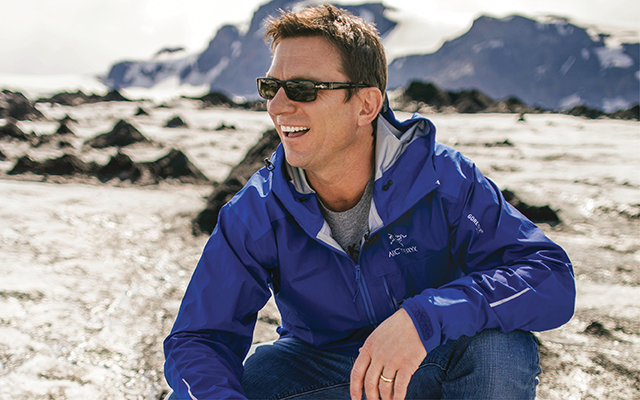

When I was a kid, I wanted to be either David Letterman or Peter Jennings,” says long-time journalist Bill Weir.
The Milwaukee native, 50, lived a transient lifestyle while very young. “My mom was a very zealous evangelical Christian who announced that they had a dream that God wanted us to maneuver to Texas,” Weir recalls. “The dreams kept coming, so I went to 17 different schools in six states, however it turned out to be great training for this job.”
He’s since reported from 49 states and more than 50 nations while covering breaking news and global trends. But he started his career as a wisecracking sports reporter within the Midwest before anchoring the popular Monday Night Live enter in Los Angeles.
“Covering sports was a great gig, but it was hyper-focused on one game or one league, and I’ve always been interested in cultural and political changes and just how the things we hold dear could go away,” he explains.
“I never thought I’d have a shot at network news,” he admits. But Weir caught a rest in 2005, when ABC News dispatched him to report from New Orleans after Hurricane Katrina. He subsequently reported from Afghanistan, Africa, and the South Pacific. He also led the network’s coverage from the war in Iraq, helped launch the weekend edition of Good Morning America, and coanchored Nightline.
Since joining CNN in 2021 as an anchor and special correspondent, he’s hosted numerous series — including The Wonder List and Trump vs. the Wild — that explored changing borders, industrialization, extinction, and other major themes.
“My goal is to find interesting narratives that help viewers know how fast our world is changing and highlight that we have so much more in common than we believe.”
Experience Life | What’s your intention in highlighting people, places, or issues that are misunderstood or taken for granted inside a long-form style like a news series?
Bill Weir | At a certain point, I had an epiphany like a journalist and as a storyteller about the power of a well-told story: Whether it’s The Iliad, the Star Wars movies, or perhaps a news report out of Puerto Rico, it doesn’t have a similar impact if we break the guidelines of storytelling.
We need a beginning, a middle, as well as an end. We need context. We need to believe in our hero and understand the villain; that’s why we binge-watch Netflix and fit in with book clubs. There’s something primal in us that responds to that. Human beings are made up of stories; they’re what separate us in the animals. We’re the creatures that can imagine living on Mars, curing a disease, or creating a different kind of government.
Unfortunately, to break news you have to break those rules. I always joke that if Wolf Blitzer was telling the storyline of Star Wars, he’d say, “Breaking news: Darth Vader is Luke Skywalker’s father.” But that doesn’t have a similar impact as when you start “In the past, in a galaxy far, a long way away. . . .”
While we’re obsessed with tweet-by-tweet breaking news, you will find 7 billion of us in the world, and we’re changing it fast, and somebody must look around and say, “Hey, guys! Remember when there used to be starfish on this beach or when people within this neighborhood had a fantastic cultural treasure and today it’s gone?”
Fortunately, through airing longer-form pieces like The Wonder List, I’ve had the space to tell the stories which have that sort of context so people can come away from it understanding voters in Iowa, the red tide in Florida, or drilling in Alaska’s Arctic National Wildlife Refuge as part of a much bigger narrative.
EL | During your time on The Wonder List, you visited many changing landscapes. What were some of your favorites and why?
BW | I really loved Iceland, because it’s an otherworldly place with such amazing people who tell great stories returning to the Icelandic myths.
Cuba changed my perceptions. I visited with a set of preconceived notions which come from American politics. It surprised me to meet so many people who were proud of the ideas of their revolution, even if it ultimately didn’t work out for them. I assumed that they wanted to become like America as quickly as possible, but they’re pretty cautious about our way of life and want to maintain their culture.
I enjoyed Bhutan, this little Buddhist kingdom tucked up in the Himalayas, where they measure their success in gross national happiness rather than gross national product. Growing from their Buddhist beliefs, they’ve made some interesting choices. For example, it’s in their constitution that a minimum of 60 percent of Bhutan’s land must be maintained as forest. They’ve rejected big, polluting industries because every tree, every rock is sacred.
Also, I was inspired by the inhabitants of an island off the coast of Greece called Ikaría, where individuals live to 100 in a higher rate than we do in the United States. In fact, one in three residents live to their 90s.
I wanted viewers to become listed on me in pondering what lessons are learned by the stories that those societies tell that make them happier and healthier than us. Comparing our choices and our values with places like this always sticks with me.
EL | You’ve joked that you’re a jaded journalist, but you’re always showing the audience small moments of meaningful connections. Why is that important to you?
BW | In our media culture, we’re sold to any or all day, every day. There are so many manufactured moments — in both political advertising or dishwashing-soap commercials — that we’ve become jaded a bit to the idea of authentic connection, but we know it when we see or feel it.
Empathy offers quite a bit to do with it. There’s grounds why you have that sort of warm feeling that spreads through you after you give a stranger directions. There’s something rewarding in the moment, but also something deeply, humanly satisfying about connecting with a stranger in a real way.
I want people to be curious about strangers, because the more you understand that stranger’s story, the greater strangers become enlightening rather than threatening.
EL | What’s an example of pure, genuine connection that you’ve witnessed or experienced firsthand that affected you?
BW | The very first time I visited Puerto Rico was when it was being shattered by Hurricane Maria as well as in the days after. People were at their most vulnerable and frightened, yet without fail these abuelas [grandmothers] will bring me inside their broken homes to create me coffee. They had no idea where I was from or why I had been there, but I was thinking about their lives and how they were doing, and they wanted to reciprocate.
EL | How has your work changed you?
BW | I think much more about how all my little decisions have ripple effects that I’ll never fully appreciate. Also, when I was a narcissistic, clueless kid who thought about being on TV because it was cool, I didn’t come with an appreciation for the people who might have been punch lines for me in everyday life.
As my view of people and the world has expanded, I can’t help but realize how connected all of us are, and sometimes that can be depressing. Simultaneously, I ponder what that kid I met on a bridge in Madagascar is doing right now, or I wonder how that elephant I took photographs of in Botswana a few weeks ago is feeling — or I think about how few elephants are left in the world. I never had much awareness when I was young.













